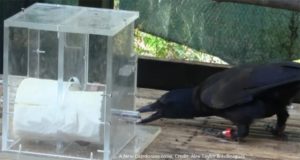Babies’ and birds’ causal understanding
A very interesting comparison between crows and humans in a new (free access) paper in Proceedings of the Royal Society B entitled "Of babies and birds: complex tool behaviours are not sufficient for the evolution of the ability to create a novel causal ntervention" by Alex H. Taylor, Lucy G. Cheke, Anna Waismeyer, Andrew N. Meltzoff, Rachael Miller, Alison Gopnik, Nicola S. Clayton, and Russell D. Gray.
Abstract:
Humans are capable of simply observing a correlation between cause and effect, and then producing a novel behavioural pattern in order to recreate the same outcome. However, it is unclear how the ability to create such causal interventions evolved. Here, we show that while 24-month-old children can produce an effective, novel action after observing a correlation, tool-making New Caledonian crows cannot. These results suggest that complex tool behaviours are not sufficient for the evolution of this ability, and that causal interventions can be cognitively and evolutionarily disassociated from other types of causal understanding.
See also a video [1] and Ed Yong's post
[1] "Causal interventions: a key difference between the minds of crows and humans" (video). Source: Youtube @rednazxela1. June 11, 2014.



